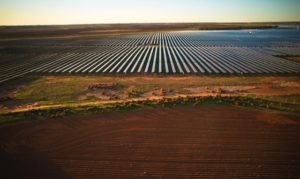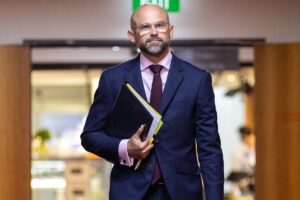Federal energy minister Josh Frydenberg is to visit what will be the world’s tallest solar tower in Israel next week as part of a government-led Austrade delegation to renewable energy and smart grid facilities in the Middle East country.
The centrepiece of the visit next week is to the 120MW Ashalim solar tower complex being built in the Negev desert, part of a 300MW facility combining two solar tower complexes (one with storage), and a large solar PV array.
The Ashalim tower, being built by GE, using Brightsource technology, will feature a 250 metre high tower – the largest in the world, and bigger than the 200m height of the Crescent Dunes facility in Nevada, the largest solar tower and storage project to be built to date.

The extreme height of the Ashalim tower is due to the restricted land area to house its plant’s 50,000 heliostats, or mirrors, which are used to direct the sun’s rays onto the tower to heat a boiler and create steam to spin a turbine; the closer the panels are to the tower, the higher the tower must be.
The visit to Ashalim will be Frydenberg’s first direct exposure to solar tower technology, but hopefully not his last, given his government’s renewed commitment to have the technology deployed in Australia. It’s a shame he won’t actually see one in operation, or with storage.
Still, the Australian government has committed to providing a $110 million concessional loan to a solar tower and storage facility near Port Augusta – a commitment reinforced and refined during its recent tax deal with the Nick Xenophon Team.
There are currently four main operating facilities around the world, including Brightsource’s Ivanpah project (no storage), Crescent Dunes (owned by SolarReserve), which has 10 hours of storage, and two smaller facilities in Spain. Others are under construction in Africa, Chile and China.
The visit to Israel is being organised by Austrade to focus on the country’s innovative energy programs, and to study how it has emerged as the best centre for start-ups outside of the US.
 Israel has raised more venture capital per capita than any other country, and is home to about 300 renewable energy/cleantech companies – including in wind, solar thermal, solar PV, smart grid, energy efficiency and biofuel technologies.
Israel has raised more venture capital per capita than any other country, and is home to about 300 renewable energy/cleantech companies – including in wind, solar thermal, solar PV, smart grid, energy efficiency and biofuel technologies.
The Austrade delegation includes representatives from EnergyAustralia, Ausnet, and the Australian Renewable Energy Agency, as well as other energy groups and consultancies.
Also on the agenda are visits to wave energy technology developer Eco Wave Power, the Enel Innovation Hub, as well as other start-ups and innovators that are focusing on smart grids and cyber security.
When operational, the Ashalim Solar Thermal Power Station will help Israel achieve its goal of having 10 per cent of its electricity production from renewable energy sources by 2020.










